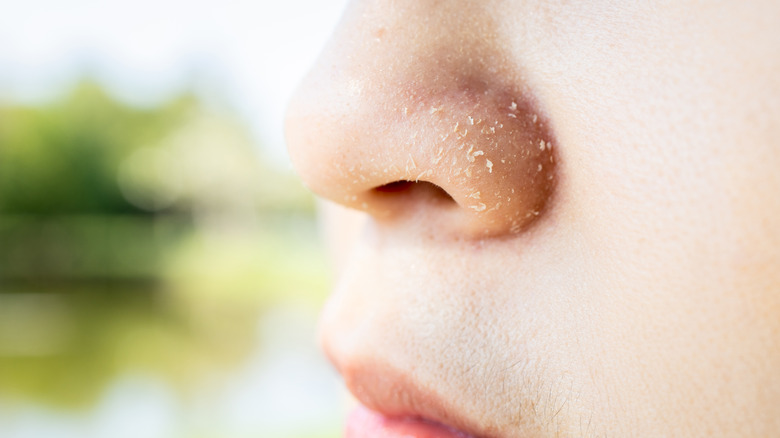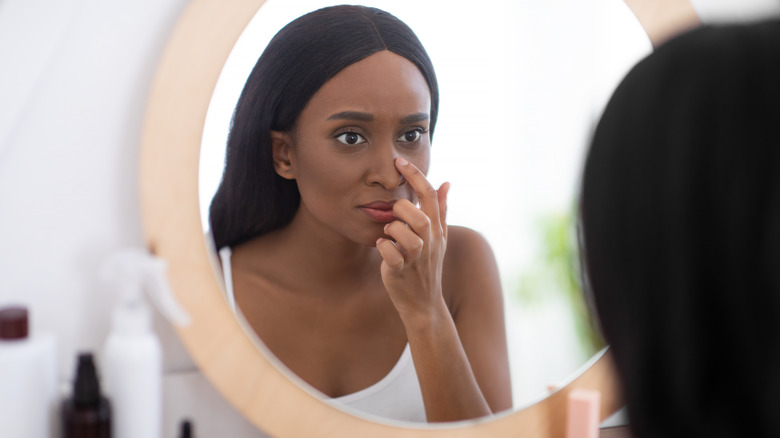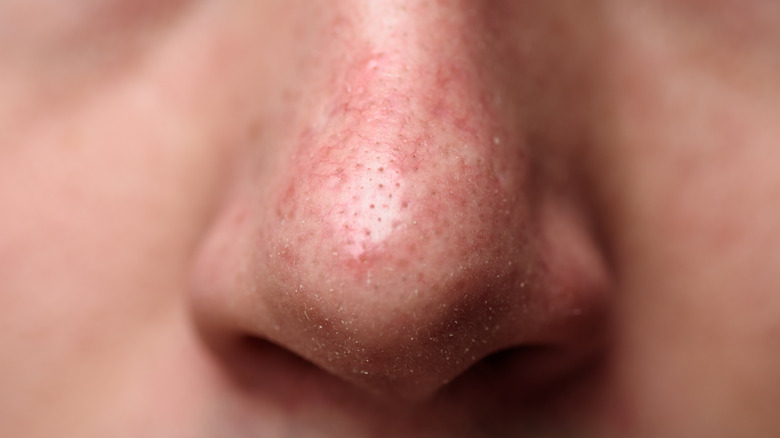How To Combat Dry Skin On Your Nose
Dry and flaky skin on your nose is never a pretty thing. In fact, it can be frustrating when the rest of your face looks and feels hydrated and your nose stubbornly refuses to get the memo.
If you woke up with a runny nose a few days ago and have been blowing into a handkerchief or tissues the whole week, this could explain why the skin around your schnoz is especially dry, according to board-certified dermatologist Purvisha Patel. But this isn't the only reason. Environmental factors like dry or cold weather, UV damage and even irritating ingredients found in your skincare products can be culprits. If you have combination skin, you may be prone to seeing dry skin in some parts of your face as opposed to others.
In some cases, dry skin on your nose can be indicative of skin conditions like rosacea or seborrheic dermatitis. While these might require a visit to the dermatologist, common causes for dry skin on your nose can be tackled with some simple things you can be doing at home.
Try these tricks at home
Taking stock of what you're putting on your face would be a good place to start with tackling your dry nose. Are any of the products you're using overly drying out your face, especially your nose? Retinoids, salicylic acid, and benzoyl peroxide are some common ingredients that cause dry skin. Cut back or reduce their use to see if it makes a difference.
Moisturizing your nose can also help. In addition to reducing dryness, moisturizing creams that contain petroleum jelly, ceramides, glycerin, and hyaluronic acid can soothe irritated skin. But be careful not to overdo it as this can affect the skin barrier. New York-based dermatologist Dr. Michele Green says that balance is everything with skincare, and this goes for exfoliating, washing your face, and moisturizing. If you think you can exfoliate away the pesky flakes you see around your nose, you're wrong. Wearing sunscreen with SPF protection whenever you go out can combat peeling skin around your nose too.
Your diet and hydration habits are next. Omega-3 and antioxidants are your best friends here, so load up on turmeric, broccoli, spinach, and green tea for antioxidants and fish for omega-3. Drinking plenty of water is a must as well. If you're dealing with peeling skin in the winter months when you're stuck indoors with a heater, it goes without saying that dry air could be the cause. A humidifier can help at such times.
How to deal with skin conditions that cause dry skin on your nose
While most cases of dry skin on the nose can be managed at home with some simple lifestyle changes, skin conditions like rosacea or seborrheic dermatitis require a more concentrated effort. You can start by consulting with your doctor. When it comes to rosacea, which is a chronic genetic condition, your dermatologist might ask you to avoid using products that contain alcohol, fragrance, glycolic acid, lactic acid, menthol, or sodium laurel sulfate. What they would prescribe, instead, are gels that contain brimonidine or oxymetazoline. These are topical applications that combat the flushing — the red skin — that is often characteristic of rosacea.
"Seborrheic dermatitis can present with dry, flaky, and red skin around the nose and can be treated with topical antifungal creams," shared New York-based board-certified cosmetic dermatologist Dr. Y. Claire Chang with Byrdie. Seborrheic dermatitis, otherwise known as dandruff, commonly appears on the creases of your nose and can come on during acne-prone years or middle age and beyond.
The important thing to remember is that skincare professionals often have useful advice on the best ways to treat dry or dehydrated skin. Trying to tackle an underlying skin condition that's causing dry skin on your nose by yourself may not be a good idea.


